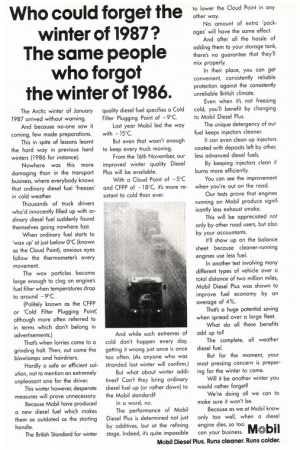Who could forget the winter of 1987?
Page 15

If you've noticed an error in this article please click here to report it so we can fix it.
The same people who forgot the winter of 1986.
The Arctic winter of January 1987 arrived without warning.
And because no-one saw it coming, few made preparations.
This in spite of lessons learnt the hard way in previous hard winters (1986 for instance).
Nowhere was this more damaging than in the transport business, where everybody knows that ordinary diesel fuel 'freezes' in cold weather.
Thousands of truck drivers who'd innocently filled up with ordinary diesel fuel suddenly found themselves going nowhere fast.
When ordinary fuel starts to 'wax up' at just below 0°C (known as the Cloud Point), anxious eyes follow the thermometer's every movement.
The wax particles become large enough to clog an engine's fuel filter when temperatures drop to around —9°C.
(Politely known as the CFPP or 'Cold Filter Plugging Point,' although more often referred to in terms which don't belong in advertisements.) That's when lorries come to a grinding halt. Then, out come the blowlamps and hairdriers.
Hardly a safe or efficient solution, not to mention an extremely unpleasant one for the driver.
This winter however, desperate measures will prove unnecessary.
Because Mobil have produced a new diesel fuel which makes them as outdated as the starting handle.
The British Standard for winter quality diesel fuel specifies a Cold Filter Plugging Point of —9°C.
Last year Mobil led the way with —15°C.
But even that wasn't enough to keep every truck moving.
From the 16th November, our improved winter quality Diesel Plus will be available.
With a Cloud Point of —5°C and CFPP of —18°C, it's more resistant to cold than ever.
And while such extremes of cold don't happen every day, getting it wrong just once is once too often. (As anyone who was stranded last winter will confirm.) But what about winter additives? Can't they bring ordinary diesel fuel up (or rather down) to the Mobil standard?
In a word, no.
The performance of Mobil Diesel Plus is determined not just by additives, but at the refining stage. Indeed, it's quite impossible to lower the Cloud Point in any other way.
No amount of extra 'packages' will have the same effect.
And after all the hassle of adding them to your storage tank, there's no guarantee that they'll mix properly.
In their place, you can get convenient, consistently reliable protection against the consistently unreliable British climate.
Even when it's not freezing cold, you'll benefit by changing to Mobil Diesel Plus.
The unique detergency of our fuel keeps injectors cleaner.
It can even clean up injectors coated with deposits left by other, less advanced diesel fuels.
By keeping injectors clean it burns more efficiently.
You can see the improvement when you're out on the road.
Our tests prove that engines running on Mobil produce significantly less exhaust smoke.
This will be appreciated not only by other road users, but also by your accountants.
It'll show up on the balance sheet because cleaner-running engines use less fuel.
In another test involving many different types of vehicle over a total distance of two million miles, Mobil Diesel Plus was shown to improve fuel economy by an average of 4%.
That's a huge potential saving when spread over a large fleet.
What do all these benefits add up to?
The complete, all weather diesel fuel.
But for the moment, your most pressing concern is preparing for the winter to come.
Will it be another winter you would rather forget?
We're doing all we can to make sure it won't be.
Because as we at Mobil know only too well, when a diesel engine dies, so too can your business. Mobil








































































































































